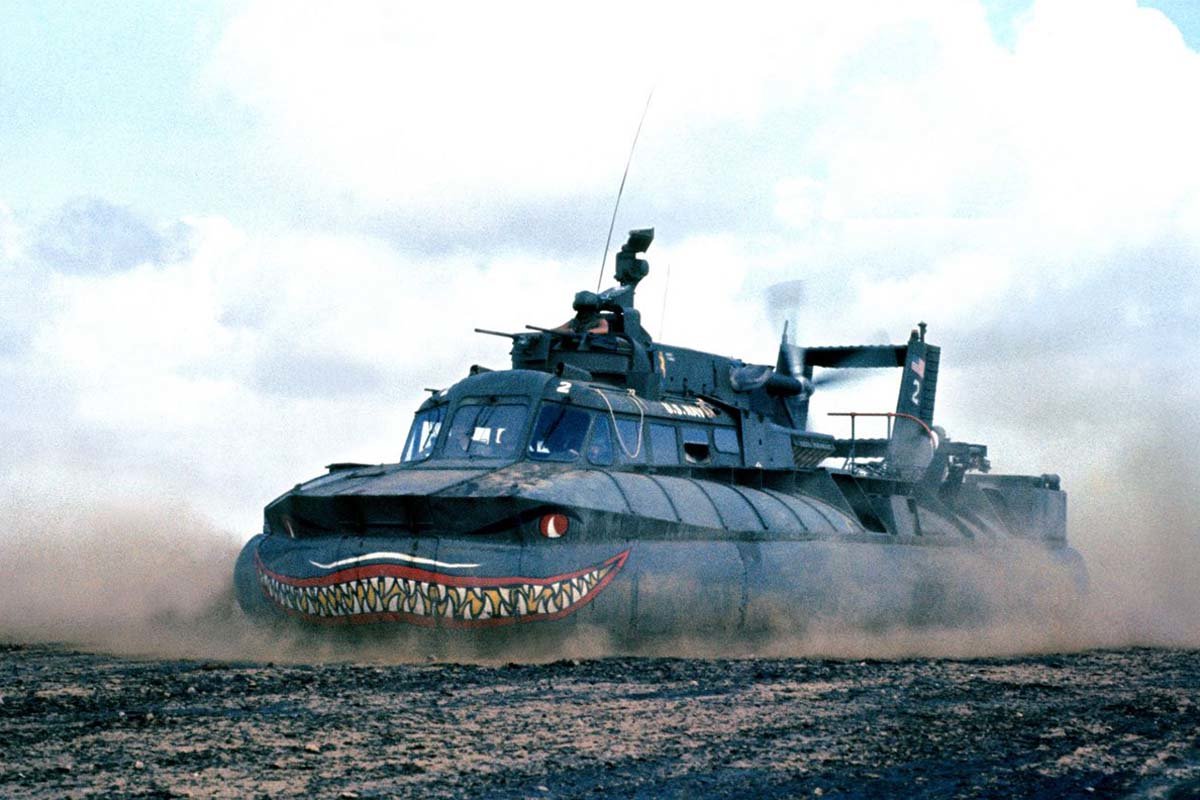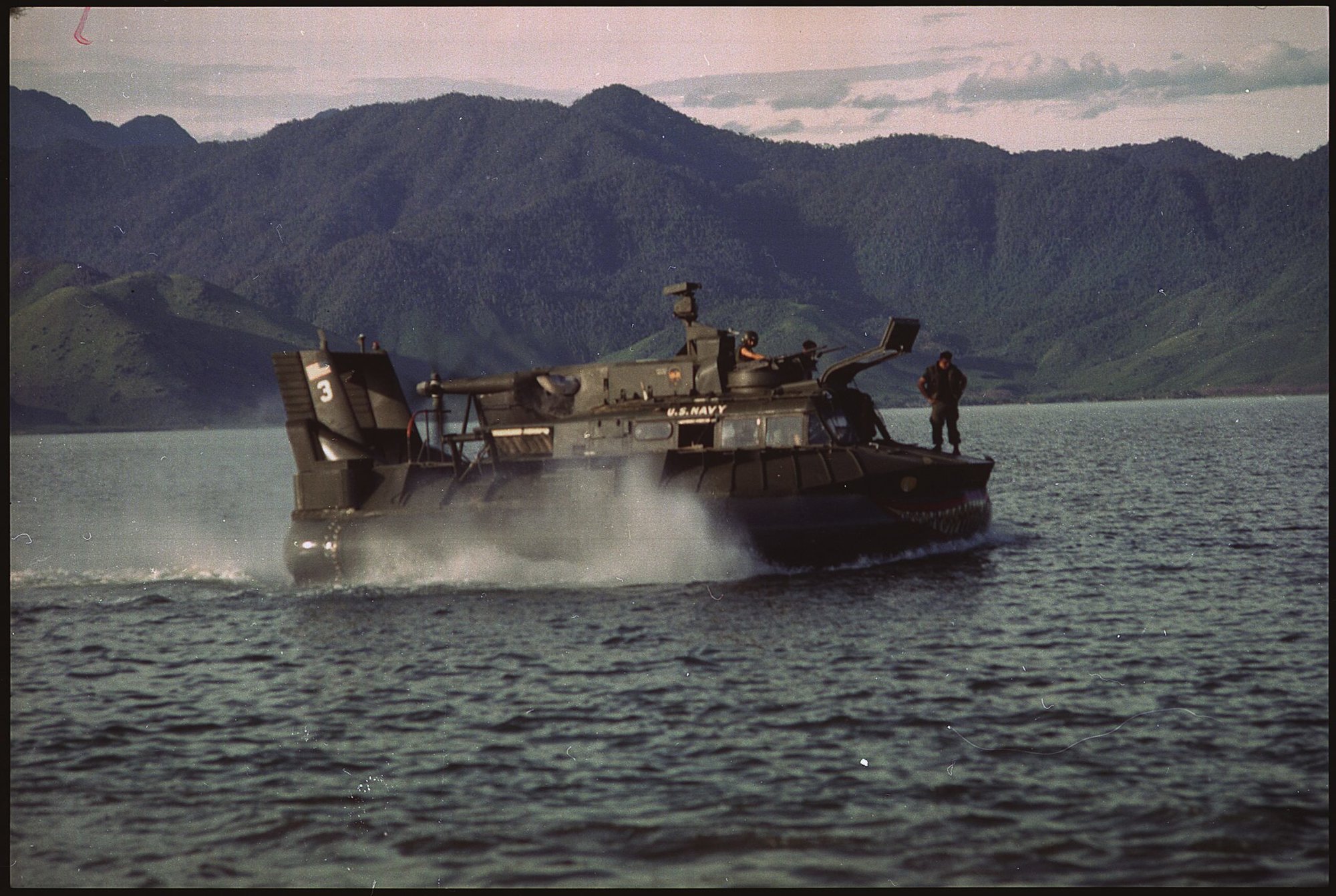Why These ‘Hovering Monster’ Hovercraft Never Quite Got Off the Ground in Vietnam

This Patrol Air Cushion Vehicle sported nose art based on a Vietnamese mythological beast. Photo courtesy of Arkansas PBS.
A Huey helicopter flying over a marsh near Saigon spotted a camouflaged sampan hidden under brush. The helicopter’s aircrew threw down a smoke grenade to mark the position. On that signal, a massive floating vessel — perhaps with an evil grin painted on the front — roared toward the concealed boat to ambush it. The hovercraft’s gunners opened fire with .50-caliber mounted machine guns. Several on board the smaller, slower sampan were killed, and others pulled from the water would become prisoners.
For a brief period at the start of the Vietnam War, US military hovercraft — called Patrol Air Cushion Vehicles, or PACVs — patrolled marshy deltas and rivers to track down enemy boats. But though the program saw some early success, the ungainly boats proved unreliable in direct combat.
Rare footage of the hovercraft in action was captured by a CBS News crew in 1968.
“This operation is actually an experiment for the hovercraft,” a reporter says, tracking a hovercraft as it closes in on a smaller boat. “Before this, they were used mainly as river patrol. Now they are being thrown into direct combat with the Viet Cong to see how they will fare.”
Beginning in 1966, PACVs worked alongside the “Brown Water Navy,” the fleet of patrol boats that skimmed down Vietnam’s muddy canals and shallow rivers. However, because the Viet Cong would escape with their sampans into waist-deep marshes in the Mekong Delta, the US Army proposed using the PACVs to chase them. The Air Cushion Vehicle Unit was formed two years later.
“The hovercraft seem to be proving their worth in the tough delta war,” CBS News reported. “Traveling at speeds up to 60 miles per hour, they can cover territory in a single day that often took weeks to clear.”
Although these rapid strike craft quickly established a feared reputation among the Viet Cong, who called them “monsters” because of their size and unique nose art, their notoriety didn’t last very long.
The hovercraft — armed to the teeth with turret-mounted .50-caliber machine guns and .30-caliber side port machine guns — seemed to be effective only if the enemy wasn’t tipped before their arrival. Excessive engine noise, as well as maintenance issues, proved to be the PACV’s Achilles’ heel.

“Later, as we interviewed villagers with our interpreter, they told us that they heard us coming long before we arrived on their rice fields,” recalled Vietnam veteran Bruce Wesson, a photographer for a Military Assistance Command Vietnam (MACV) film team between 1967 and 1968. “That would have been ample time for the Viet Cong (VC) on the riverbanks ahead to prepare an ambush or for VC sympathizers living in the village to radio ahead to alert them to our presence.”
Wesson’s mission was to produce material to release to worldwide television networks and media outlets, including on the experimental PACVs.
“The important lesson learned was that the hovercraft appeared unsuited for deployment as intended,” Wesson wrote. “Troops on decks were vulnerable to fire, the skirt and propellers were easily damaged and the excessive engine noise eliminated any aspect of stealth.”
Among the six total hovercraft deployed to Vietnam between the Army and Navy, only one from each service branch survived. The Army’s hovercraft can be found on display at the Army Transport Museum in Virginia.
Read Next: WATCH: The Brown Water Navy and Swift Boats of Vietnam

Matt Fratus is a history staff writer for Coffee or Die. He prides himself on uncovering the most fascinating tales of history by sharing them through any means of engaging storytelling. He writes for his micro-blog @LateNightHistory on Instagram, where he shares the story behind the image. He is also the host of the Late Night History podcast. When not writing about history, Matt enjoys volunteering for One More Wave and rooting for Boston sports teams.
BRCC and Bad Moon Print Press team up for an exclusive, limited-edition T-shirt design!
BRCC partners with Team Room Design for an exclusive T-shirt release!
Thirty Seconds Out has partnered with BRCC for an exclusive shirt design invoking the God of Winter.
Lucas O'Hara of Grizzly Forge has teamed up with BRCC for a badass, exclusive Shirt Club T-shirt design featuring his most popular knife and tiomahawk.
Coffee or Die sits down with one of the graphic designers behind Black Rifle Coffee's signature look and vibe.
Biden will award the Medal of Honor to a Vietnam War Army helicopter pilot who risked his life to save a reconnaissance team from almost certain death.
Ever wonder how much Jack Mandaville would f*ck sh*t up if he went back in time? The American Revolution didn't even see him coming.
A nearly 200-year-old West Point time capsule that at first appeared to yield little more than dust contains hidden treasure, the US Military Academy said.












